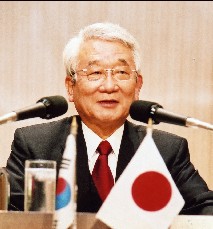"Law in the globalizing world"
February 15th, 2006
Mr. Akio Harada,
Lawyer of Hironaka Law Office
The ex-Public Prosecutor General
 When a dispute occurs, it is settled legally first. It is a foundational rule in the United States. There is a judge in any town, and litigants are to follow his decision. In Japan, it is the last means to come out to the public place. Usually, people try to solve the dispute by talks somehow between the interested parties, or by interposing the third party.
When a dispute occurs, it is settled legally first. It is a foundational rule in the United States. There is a judge in any town, and litigants are to follow his decision. In Japan, it is the last means to come out to the public place. Usually, people try to solve the dispute by talks somehow between the interested parties, or by interposing the third party.
Mr. Derek Bok, the President of the Harvard University Law School, pointed out that the United States faced criticism at the beginning of 1980 that there were too many lawyers. He cited that US lawyers are familiar with too much confrontational handling, and tend to guide there. It likely occurs to advance confronting at once without showing the idea of what an effective method of solution is. He emphasized the gentler arts of reconciliation and accommodation and advocated, ��It is necessary for lawyers to guide people to seek the interest of not only the individual, but also the entire society��.
The United Nations submitted the report, ��A more secure world: Our shared responsibility��, at the beginning of December 2004. The report says, ��The realities of various threats in the world are social crisis, various kinds of conflicts, the proliferation of weapons of mass destruction, terrorism, and organized crimes resulting from poverty, epidemics, and environmental destruction, etc., and those threats are mutually related. To cope with them effectively, it is necessary for political, social, and economic measures to be taken based on the systematic and comprehensive judgment from an international point of view beyond a country view.�� The United Nations submitted the report, entitled ��Crossing the Divide��, in November 2001, when they specified the ��Year of Dialogue among Civilizations��.
It says, "Listen to what someone says well,�� and the ��Purpose of the dialogue is to learn what we have not seen. Listen to a different opinion. Learn how to manage and appreciate diversity. Reflect on our own perceived notions. Share insight together.�� In addition, it says, ��Globalization may lead us to the real global society through dialogue instead of faceless ignorance and arrogance. The globalization may bring an ideal method of global interchange and true respect for diversity through dialogue, not exclusion and exclusive violence based on malice.��
The professor of the psychology of the University of Michigan, Mr. Richard Nisbett, published the book, ��The geography thought��, in 2003. It says, ��There is a different aspect between an Oriental idea and a Western idea. The Western people look at a thing as splitting in two, black and white. The Oriental people see things in their background. The difference exists fairly psychologically.�� He emphasizes that Oriental and Western people should cooperate with each other to the future through dialogue, by mixing the respective thoughts with knowing each merit and the weak point well.
Mr. Theodore De Baly, of Columbia University, in his book titled ��Nobility and Civility��, is trying to check the behavior the Oriental leaders and people from ancient times to the early modern age, including India, China, and Japan, to draw what the leaders ought to be and to catch it as wisdom of the Orient.
It is reported that Mr. Lawrence Summers said in the latest Davos Forum, ��The world is now facing big revolutions, such as the Renaissance and the Industrial Revolution. The prosperity of Asia and huge progress of technologies will make the Western rule end.�� I think it means that the Western rule will not end, but only the rule by the West will end, and it is required to have a dialogue on an equal footing between the West and the Orient. It may be necessary for Japan as being in the position to be able to know both of the West and the Orient to seek interest for both through dialogue.